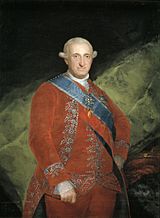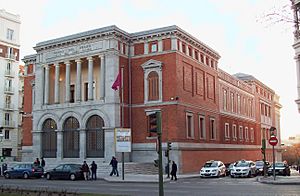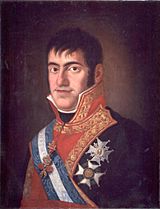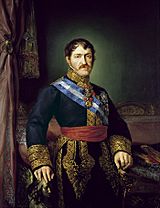Spanish succession issue of 1789 facts for kids
The Spanish succession issue of 1789 was a big discussion and set of decisions made during meetings of the Cortes (a kind of parliament) in Spain. King Carlos IV started it. He wanted to change the rules about who would become the next king or queen. The old rule meant that only sons could inherit the throne, unless there were no sons at all. Carlos IV wanted to change it so that daughters of the main royal family line would have a better chance to become queen, even if there were male relatives from other family lines.
The Cortes agreed to the king's idea and asked him to make it a law. However, the law wasn't officially published until 1830. This delay caused a huge fight within the royal family and led to a series of civil wars called the Carlist Wars. People argued for a long time about whether the succession law was truly changed in 1789. Today, historians still discuss it, but it's usually seen as a complex and somewhat unclear event.
Contents
Why the Change Was Discussed

Carlos IV became king of Spain in December 1788. In May 1789, he called for the Cortes to meet. The main reason for this meeting was for the Cortes to swear loyalty to his son, Prince Fernando, who was five years old and the next in line to the throne. This was a normal event.
However, the king also asked the representatives (called procuradores) to be ready to discuss other important, but secret, matters. The Cortes had about 70 members, chosen by different towns. They started arriving in Madrid in the summer. The first official meeting was on September 19, 1789. The king told them they would discuss "other matters" after the loyalty ceremony.
On September 23, the grand ceremony where Prince Fernando was sworn in took place at the church of San Gerónimo. A week later, on September 28, the king met with the president of the Cortes, Count of Campomanes, and the prime minister, Count of Floridablanca. They talked about the worrying news from the French Revolution. They also discussed the plan to change the succession law. They decided to start the process at the next Cortes meeting and keep it a secret.
The Secret Meeting of September 30, 1789
The representatives met again on September 30 at the Buen Retiro Palace. Almost all of them were there. The president told everyone they had to take a strict oath of secrecy. They promised not to tell anyone what was discussed unless the king or president allowed it.
After the oath, the president read the king's proposal. The king wanted to replace the 1713 succession rules. These rules mostly stopped women from inheriting the throne. The king wanted to go back to the older Spanish medieval rules, which treated sons and daughters equally when it came to inheriting the crown. The king's proposal said the 1713 rules were old-fashioned and had caused problems.
Then, a draft of a petition (a formal request) from the Cortes to the king was read. It was short and asked the king to publish a law that would bring back the medieval succession rules. The 1713 rule was often called "Semi-salic law" or "Salic law" because it was similar to a French law that only allowed men to inherit.
We don't know if the representatives were surprised by this big change. The records only say that the representative from Burgos, Marqués de Villacampo, spoke for everyone and said they agreed. All the representatives signed the petition. The meeting ended around noon. Historians say the discussion about succession took "a matter of minutes."
What Happened Next in October 1789
The Cortes met again on October 3, 1789. They reviewed and agreed to the record of the September 30 meeting. There's no sign of any arguments or disagreements. Four days later, on October 7, church leaders (bishops and archbishops) also looked at the Cortes' petition. They fully supported the changes and said it was good to bring back the "original and natural order."
Later in October, a legal advisory group also reviewed the petition. In a letter to the king on October 30, they fully supported the Cortes' idea. The king agreed in writing on the same day, saying he would make the "resolution corresponding to the accompanying petition" and that it must remain a secret.
The Cortes met several more times in October, but they discussed other topics like land ownership. On October 31, the president told the representatives that the king had answered all their requests. For the succession issue, the king said he would order his Council to publish the new law when he thought it was the right time. The representatives again promised to keep it secret. They also said they hoped the law would be made official soon. The king announced that the Cortes would close on November 5. Six days later, the Cortes officially ended, having "met its objectives."
After the Cortes Meeting
Normally, once a law is approved, it is published for everyone to know. However, no law changing the succession rules was published at that time. Even in 1805, when a new collection of important laws was published, it still referred to the 1713 rule and said nothing about any changes.
In 1808, Carlos IV gave up his throne, and his son, Fernando VII, became king. Fernando VII had no children. People thought that if he died without a son, the throne would go to his younger brother, Don Carlos.
Then, on March 29, 1830, Fernando VII finally published a document. He said it was the 1789 succession law. The document explained that difficult times had prevented the law from being published earlier. Now that there was peace, the "Pragmática-sanción" (a type of royal decree) of 1789 was being published. This document, along with others, detailed what happened in 1789. These documents are still the main source of information about the 1789 succession debate.
The 1830 document meant that if Fernando VII had a daughter, she could inherit the throne. At first, this seemed unimportant because the king had no children. But in May 1830, it was announced that the Queen was pregnant. In October 1830, she gave birth to a daughter, Isabel. This meant that Don Carlos would no longer be next in line.
Don Carlos refused to accept this new law. This started a big fight within the royal family. This fight, combined with political disagreements between different groups in Spain, led to a series of civil wars that lasted for many years.
Was the 1713 Law Changed?
For a long time, the events of the 1789 Cortes were mostly forgotten. But starting in the 1830s, they became a huge topic of debate. The main question was: did the 1789 Cortes actually change the 1713 succession law? This became one of the most argued-about legal issues in 19th-century Spain. People wrote countless books and articles arguing for or against the change. The debate continued for decades.
Those who believed the 1713 law was *not* changed supported Don Carlos and his followers (known as Carlists). Their main argument was that since the 1789 agreement was never officially published as a law, it never became legal. They also argued that the representatives weren't allowed to discuss the issue, that the king didn't formally approve it, that there's no such thing as "secret laws," and that the 1805 collection of laws still showed the 1713 rule as valid.
Those who believed the 1789 Cortes *did* change the law supported Fernando VII's descendants (known as Cristinos or Isabelinos). They argued that Carlos IV and the Cortes fully agreed on the new law, and publishing it was just a small technical step. They also claimed that the representatives *were* allowed to discuss all issues, that the law wasn't applied unfairly to Don Carlos, and that Fernando VII, as the king's son, had the right to publish the law when he chose. Some believed the law became active in 1789, while others said it only became active when Fernando VII published it in 1830.
Other Interesting Questions
Besides whether the law was legally changed, two other big questions are: why did Carlos IV want to change the law, and why did he keep it a secret?
Many historians think the change was related to foreign policy, especially the idea of uniting Spain with Portugal. In 1788, Carlos IV's daughter, Carlota Joaquina, became the future queen of Portugal. If she could also become queen of Spain, it would create a powerful Spanish-Portuguese union.
Another reason might have been to protect the succession for Carlos IV's own children. He had four daughters and two young sons in 1789. He had also lost four other sons who died very young. He might have feared losing his remaining sons and wanted to make sure his daughters could inherit the throne. Some historians also suggest he wanted to restore traditional Spanish laws.
The secrecy was likely due to fears of how other countries, especially France and Naples, would react. When news of the 1789 agreement leaked out, the rulers of those countries did protest to Madrid. After the French Revolution, Carlos IV wanted to avoid upsetting his powerful neighbor. Some historians also think Carlos IV wanted to keep his options open and decide later whether to apply the new rule. However, the exact reasons for the secrecy are still a bit unclear.
Other questions about the 1789 Cortes include: Was this meeting normal or unusual? How much did new ideas from the Enlightenment influence the process? Did the Cortes make the king more powerful or less powerful? How much did Floridablanca and Campomanes influence the decisions? Who was the main person pushing for the change in succession law? And why did the representatives agree so quickly?
How Historians See It Today
Today, the 1789 succession law doesn't get as much attention from historians as it did in the 19th century. Some historians see it as the most important part of the 1789 Cortes, while others see it as a minor issue compared to other topics like land reform. Some history books don't even mention the 1789 debate when discussing Carlos IV, only bringing it up when talking about Fernando VII's 1830 document.
Most historians today try not to say definitively whether the law was changed or not. Their wording can be very different. Some suggest that Carlos IV did make the law but kept it secret. Others say the 1713 law was changed in 1789, but the decision wasn't published until 1830. Some just say that the Cortes approved the idea or that Carlos IV wanted to return to older laws.
Finally, some historians believe the new law was "agreed" or "formulated" in 1789, but it didn't become active then. This is also what most historians linked to Carlism believe, though they also argue that the 1830 publication wasn't legally binding either. One historian suggests looking at the 1789 events as just one part of a longer story, starting with the 1713 law and ending with a decree in 1832.
See also
 In Spanish: Pragmática Sanción de 1789 para niños
In Spanish: Pragmática Sanción de 1789 para niños
- Carlism
- Alfonsism
- Succession regulations of 1713
- Succession regulations of 1830
 | Laphonza Butler |
 | Daisy Bates |
 | Elizabeth Piper Ensley |





